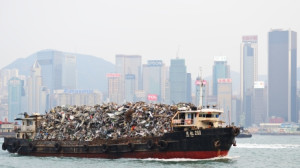 Most of what we buy or consume requires trade-offs. When it comes to some of the most important features–convenience, thrift and environmental friendliness—we often settle for one or two out of three.
Most of what we buy or consume requires trade-offs. When it comes to some of the most important features–convenience, thrift and environmental friendliness—we often settle for one or two out of three.
A book and a few Web sites devoted to the “zero waste” movement have convinced me to try a little harder on the third count.
At first I was skeptical of claims that the typical American produces more than four pounds of garbage a day. Just observing our household patterns, though, convinced me that we’re generating a lot more trash than I thought. And too much of that trash either wasn’t being recycled or couldn’t be recycled. (We’re not alone…I found this rubbish map from the Economist showing the U.S. and Norway, of all places, are tops at producing trash.)
I’m not ready to go to some of the lengths that the truly devoted advocate to reduce our trash to what would fit in a Kleenex box. But we’re taking a few baby steps:
We’re finally getting a composter. We composted on the farm where I grew up, but it was a pretty simple chore. Compostable food scraps went into a bucket Mom kept under the sink. Every few days it was my job to take the bucket and a shovel to the garden to bury the scraps. They disappeared almost magically. We never turned up an eggshell or coffee filter later on. The small lot we live on now doesn’t allow that kind of “lazy composting,” but the city of Los Angeles offers a $20 composter I’m going to try.
I’m remembering to take my reusable bags to the store. They’re way better than the flimsy plastic bags grocery stores provide (and that LA is about to ban). But I managed to ignore that until a lovely, expensive bottle of olive oil fell out of tear in one of those flimsies and shattered on our driveway. Now my groceries come home in strong, resilient, reusable totes that don’t let the contents roll all over my car.
I’m thinking about packaging before I buy. There’s usually a choice between recyclable and not. Surprisingly often these days, you don’t have to pay more for the greener option. This extends to fast food outlets. Carl’s Jr., a favorite burger chain here, wraps its food in paper and cardboard. McDonalds, by contrast, continues to use Styrofoam and non-recyclable plastic. The purists would bring their own plates, cups and cloth napkins to a fast food joint, or avoid such restaurants altogether, but for now I’m content to pick Carl’s.
We just had an almost-zero-waste BBQ. I’d convinced myself you couldn’t have a party without filling a trash bin, but I was wrong. I made pitchers of lemonade and cucumber water instead of providing bottled water. We used cloth napkins, regular cutlery, and real plates and glasses for the most part. The plastic cups for the kids were recyclable (as were the beer and wine bottles). I even managed to skip the Styrofoam trays that usually accompany meat: We bought some lovely tri-tip roasts from a local butcher, who wrapped them in paper. At the end of the night, the only thing that went into the trash were the hot dog wrappers. It was fun, and the cleanup wasn’t that hard.
Some resources if you’re interested in learning more:
“The Zero-Waste Lifestyle: Live Well by Throwing Away Less” is a book by Amy Korst that suggests ways to reduce, reuse and recycle that range from the easy (like remembering those tote bags!) to the advanced (Diva Cups, anyone?).
Zero Waste Home is the blog of Bea Johnson, who wrote a book by the same name. I especially like the posts where she talks about zero waste and raising kids.
The Nonconsumer Advocate is a perfectly delightful Portlandian named Katy Wolk-Stanley who describes herself as a “library patron, leftovers technician, Goodwill enthusiast, utility bill scholar, labor and delivery nurse, laundry hanger-upper, mother and citizen.” Her commentary about some of her more absurd Goodwill finds—found under the heading “Goodwill, Badwill, Questionable-Will”—are particularly hilarious.
This is something that my wife and I had done well with before, but we have fallen apart lately. We have a lot more waste with the baby, but I am trying to get back on the wagon. I got really excited when you said tri-tip. That is an all-time favorite of mine, but it is very hard to find around here. Nice work Liz!
You’ll just have to come visit Southern California soon!
The Los Angeles $20 composter is awesome. When I lived in a rental house, we purchased and used one and it really was great. We left it outside our laundry room off the kitchen, filled up a small trash can in our kitchen and when it was full, dumped it into the composter, which never smelled. It took a long time to fill it (we never got to the point of using it for our garden), but if you’re willing to commit, it would make great mulch!
You’re right, it’s time we try again too. We never fill our garbage can, and almost always fill our recycle bin. Why do we have so much to recycle, I wonder? Boxes from the frozen food my teenager eats, milk cartons, yogurt containers. What can I reduce? My son is opening up to eating more fresh foods. I’m going to have to look at our recycle bin and see where else we can make a positive impact. Thanks, Liz, for getting me thinking about “zero waste.”